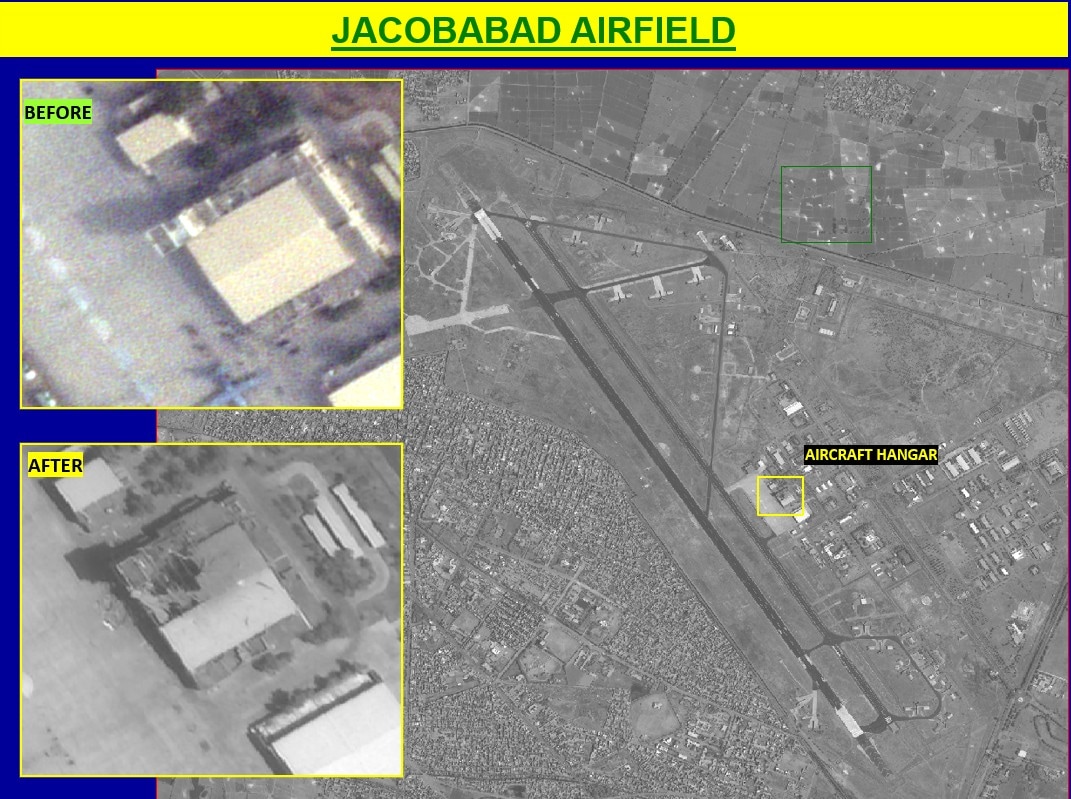
The Indian Armed Forces have shared satellite images that reveal visual evidence of the destruction caused by Operation Sindoor at terror sites across Pakistan and Pakistan-Occupied Kashmir (PoK). The visuals show before-and-after comparisons of two prominent targets: Muridke and Bhawalpur, as well as India's retaliatory strikes on Pakistan's air defence radars and airfields.
India's calibrated military response to the April 22 Pahalgam terror attack targeted terror infrastructure across Pakistan and Pakistan-Occupied Jammu and Kashmir (PoJK) - which were home to operational centres for Lashkar-e-Taiba (LeT), Jaish-e-Mohammed (JeM), and Hizbul Mujahideen. In an overnight attack last week, the Indian Armed Forces carried out the missile strikes on nine terrorist facilities - four in Pakistan (Bhawalpur, Muridke, Sarjal, and Mehmoona Joya), and five in PoK (Sawai Nala, Muzaffarabad, Syedna Bilal, Muzaffarabad, Gulpur, Kotli, Barnala, Bhimber, and Abbas, Kotli), they said.

Murdike, a major commercial hub, is home to the headquarters of the Lashkar-e-Taiba. It is known as the "terror nursery" of Pakistan. LeT's headquarters is reportedly spread over approximately 200 acres and houses a terror training camp and other infrastructure.
The Hafiz Saeed-led terror outfit is believed to be behind the April 22 attack in Baisaran near Jammu and Kashmir's Pahalgam in which 26 people were killed.
Before and after pictures of Operation Sindoor in Muridke - Point 1 and 2


Before and after pictures of Operation Sindoor in Muridke - Point 3 and 4


India's strikes also targeted Bahawalpur in Pakistan's Punjab - which serves as the base of the Jaish-e-Mohammed.
The Masood Azhar-led terror outfit is the mastermind behind the 26/11 attacks in Mumbai in 2008.
Here are before and after pictures of Operation Sindoor in Bahawalpur:





Operation Sindoor on Pakistan's airfields
After India launched precision cruise missile strikes at terror infrastructure to avenge the Pahalgam attack, Pakistan escalated the situation by attacking civilian areas in India with drones. In response, India hit selected military targets deep inside Pakistani territory such as radar installations, command and control centres, and ammunition depots in Rafiqui, Chaklala, Rahim Yar Khan, Sukkur, and Sialkot among others.
According to the Indian military, the country's actions on the nights of May and 10 were the first instance of a country damaging air force camps of a nuclear country.
"Within three hours, 11 bases were attacked, including Nur Khan, Rafiqui, Murid, Sukkur, Sialkot, Pasrur, Chunian, Sargodha, Skaru, Bholari, and Jacobabad," Air Marshal AK Bharti said at a press conference on Monday.
"It was time to convey some message to the adversary... hit where it would hurt. India's retaliation though was precise, and measured. We have the ability to target every system in the air bases, but we showed restraint to avoid escalation," he added.
Before and after pics of the airfields post Operation Sindoor:
Pasrur Air Defence Radar

Chunian Air Defence Radar

Arifwala Air Defence Radar

Sargodha Airfield

Rahim Yar Khan Airfield

Chaklala Airfield (Nur Khan)

Sukkur Airfield

Bholari Airfield

Jacobabad Airfield

India-Pakistan tensions
India last week carried out 24 missile strikes in 25 minutes across nine locations in Pakistan and Pakistan-Occupied Kashmir, killing 100 terrorists. According to the government, it went for the "snake's head and not foot soldiers" this time, demonstrating its new approach to killing terrorists within Pakistan.
Tensions between the two countries heightened after India's Operation Sindoor. Since then, India repulsed multiple waves of drone and missile attacks by Pakistan targeting Indian military installations in Jammu and Kashmir, Rajasthan, and Punjab. On Saturday, multiple explosions were reported across multiple Pakistani air bases and were also heard in Srinagar. By evening, Pakistan called for a ceasefire, but ended up violating it within hours.
Sunday night was the "first calm" night along the Line of Control (LoC) in recent days, the Indian Army said.
"The night remained largely peaceful across Jammu and Kashmir and other areas along the International Border. No incidents have been reported, marking the first calm night in recent days," army sources told NDTV.
Track Latest News Live on NDTV.com and get news updates from India and around the world

